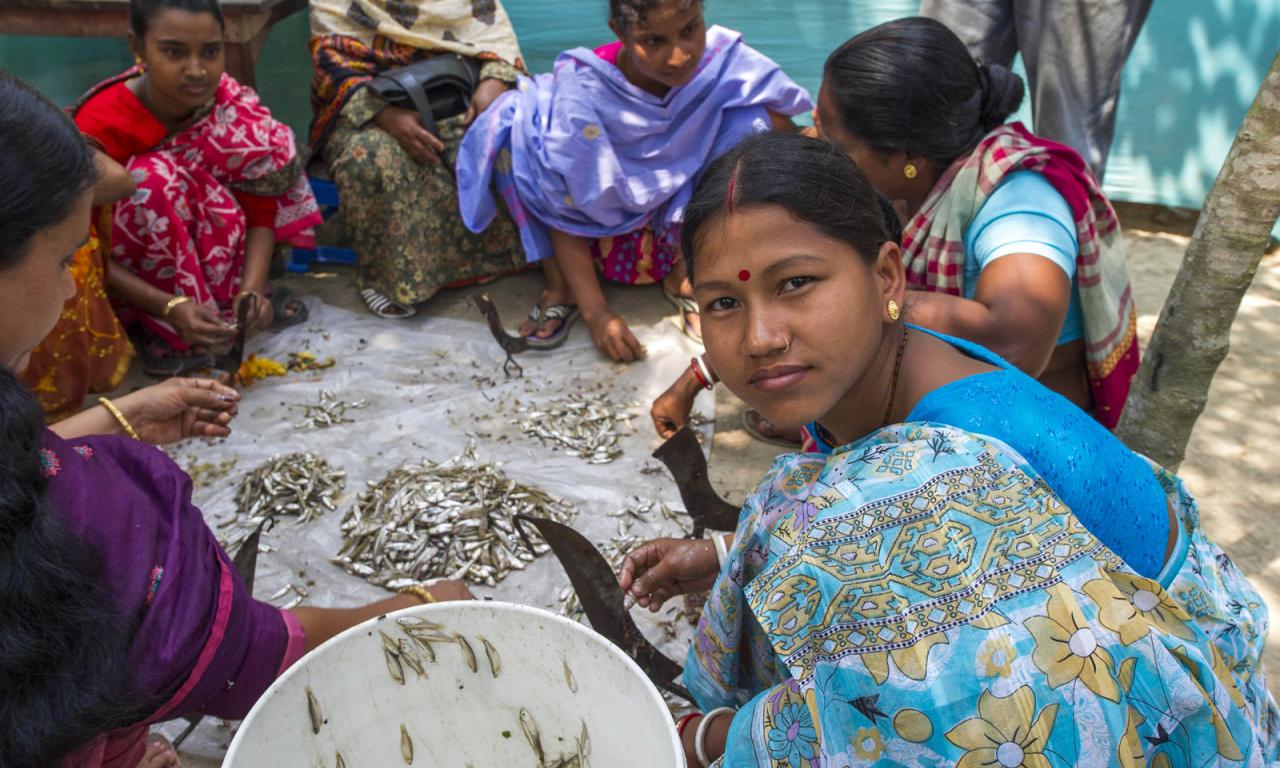
Aquatic foods are key to transforming global food systems in support of sustainable healthy diets, said panelists at the launch of a UN Nutrition discussion paper. The panel recognized the potential of aquatic foods to enhance food and nutrition security within planetary boundaries, reinforcing the publication’s findings.
The paper, The role of aquatic foods in sustainable healthy diets, is UN Nutrition’s first discussion paper on aquatic foods. Co-authored by 2021 World Food Prize Laureate and WorldFish Global Lead for Nutrition and Public Health Dr. Shakuntala Thilsted, the publication gathered existing evidence to make formal recommendations on the role of aquatic foods in the global food systems agenda.
The webinar assembled a panel of food and nutrition experts and development leads who discussed the research, policy and investments needed to harness the power of aquatic foods to realize the Sustainable Development Goals, with a focus on malnutrition and health.
“We must mainstream aquatic foods in healthy diets and the global policy agenda for game-changing solutions. It is time to seize the potential for aquatic foods to transform food systems and nourish all people and our planet,” said keynote speaker Dr. Gareth Johnstone, WorldFish Director General.
Sustainable, healthy diets that promote inclusivity are integral to the well-being of all people. Aquatic foods are often the most accessible animal-sourced food for millions in low- and middle- income countries, providing vital micronutrients during the first 1000 days of life and beyond.
“There can be no transformation of food systems if we fail to include foods from water. We must put to use the vast potential of aquatic foods, many of which are super foods for women and young children,” said Dr. Thilsted, the paper’s co-author and the Global Lead of Nutrition and Public Health at WorldFish.
Supporting health and sustainability
While sustainability and health are highly prioritized on the global development agenda, the terms are poorly defined and often used indeterminately. The paper’s authors sought to succinctly define the terms with real world applications.
“Sustainable, healthy diets must be accessible, affordable, safe, equitable and culturally acceptable,” said Molly Ahern, the paper’s co-author and Food and Nutrition Security Specialist at FAO.
To ensure sustainability, there should be a renewed focus on lower trophic level species, which are capable of reproducing their biomass up to five times a year and can be consumed whole, reducing food loss and waste, said Ahern.
The paper’s definitions expanded on WHO’s Guiding Principles For Sustainable and Healthy Diets, which call for foods that promote all dimensions of individual well-being and have low environmental impact.
Aquatic foods improve cognitive development in young children, reduce stunting and are associated with positive behaviour and mental health outcomes. They also have lower environmental impact relative to most terrestrial animal-sourced foods and provide employment to approximately 60 million people, many whom are rural poor.
Ensuring access to healthy diets

As the world prepares for the upcoming UN Food Systems Summit, there is increased focus on access and equitability. The paper presents a number of strategies to ensure healthy diets for all: promoting changes in consumer behavior, increasing the sustainability of productions systems and improving the governance of aquatic resources.
For instance, artisanal inland fisheries are often underrepresented in the food systems agenda, but 90 percent of inland catch is consumed locally, said Ahern. Local aquatic food production systems offer vast potential to improve food security in low- and middle- income countries.
Aquatic foods can thus be made accessible to rural inland communities – in Malawi and Zambia, small pelagic fish are dried and ground into powder, extending shelf life and simplifying transport. They can also be incorporated into national dietary guidelines and school feeding programs to improve consumption in young children, said Dr. Thilsted.
Panelists also spoke of the need to engage the private sector to develop desirable and affordable aquatic food products from low-trophic aquatic species and by-products. Such innovations include seaweed-derived convenience food products with a low carbon footprint.
While the paper aims to build consensus on the role of aquatic foods in healthy diets, it also emphasizes the need for new innovations and technologies to facilitate large-scale food system shifts that alleviate food and nutrition insecurity.
“Achieving food security and ending malnutrition is our common goal. The global food system must be transformed to become nutrition-sensitive and sustainable, with everyone granted access to safe, diverse and high-quality diets at all times,” said Dr. Thanawat Tiensin, Chair of the UN Committee on World Food Security.
